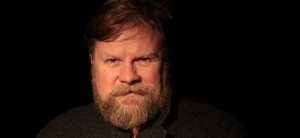GESCHICHTN VOM BRANDNER KASPAR
In the organizer's words:
TALES OF BRANDNER KASPAR
Folk play in 4 acts by Franz Xaver Kroetz freely adapted from motifs by Franz von Kobell
After a quarter of a century, Brandner Kaspar returns to the Residenztheater - and how!
For it is almost as long since Franz Xaver Kroetz declared that he no longer wanted to publish for the theater. But for Brandner Kaspar, the most Bavarian of all theatrical material, he was persuaded once again and wrote his "Brandner Kaspar" for the Residenztheater, where it will now be premiered.
Based on Franz von Kobell's dialect tale, Kroetz tells the story of the stubborn Bavarian who won't even bow to death in the flesh, the Boanlkramer, in a very honest and touching, yet completely unsentimental and humorous way. Of course, in Kroetz's play Brandner also cheats Boanlkramer at cards with plenty of Kerschgeist, but the price he pays for the eighteen years of life he has gained is high. Because when his beloved granddaughter, Seferl, dies during the cattle drive, he suddenly finds himself alone. His wife died years ago and he only receives postcards from his daughter from afar. The loneliness takes all the joy out of his life, but the fear of death and what comes next is simply too great for him to voluntarily give up his winnings and resign prematurely. But the Boanlkramer, who has a fox-like Peter breathing down his neck, has an idea: a window in the sky provides a glimpse of paradise and a quick look "costs nothing"...
Günther Maria Halmer also returns to the Residenztheater as Kaspar Brandner and, together with Munich film, drama and opera director Philipp Stölzl, they will bring the "Gschichtn vom Brandner Kaspar" to the stage as a "big picture book, because the play is of course a fairy tale", as Franz Xaver Kroetz's stage directions say.
About the author Franz Xaver Kroetz
Franz Xaver Kroetz was born in Munich in 1946. After dropping out of school, he attended a private drama school in Munich and later the Max Reinhardt Seminar in Vienna, both of which he finished early. After passing his acting exams at the Büchner Theater in Munich. Contact with Rainer Werner Fassbinder's "antitheater". At the same time, he keeps his head above water with odd jobs. He directs at the Tegernseer Bauerntheater and writes a large number of plays, which he burns. Between 1968 and 1969, he wrote his first plays that are still in existence today, including "Wildwechsel" (premiere 1971, Städtische Bühnen Dortmund) and "Heimarbeit" (premiere 1971, Münchner Kammerspiele). Thanks to a one-year drama scholarship from the Suhrkamp publishing house, Kroetz was able to devote himself entirely to writing and achieved his breakthrough. In 1971, he wrote "Stallerhof" (premiere 1972, Deutsches Schauspielhaus Hamburg), "Wunschkonzert" (premiere 1973, Staatstheater Stuttgart), "Geisterbahn" (premiere 1975, Ateliertheater am Naschmarkt Vienna) and "Lieber Fritz" (premiere 1975, Staatstheater Darmstadt). Kroetz became the most frequently performed contemporary German-language playwright and also directed some of his plays himself. His premieres often caused scandals and protest demonstrations. In 1971, he joins the German Communist Party DKP. In the same year, Rainer Werner Fassbinder filmed "Wildwechsel", followed by further television adaptations of his plays, some of which he directed himself. By 1977, he had written at least twenty plays, including "Agnes Bernauer" (premiere 1977, Schauspielhaus Leipzig). They received numerous awards, with "Das Nest" winning the Mülheim Dramatist Prize in 1976. He also worked repeatedly as an actor in theater, film and television. He became well known in 1986 for his role as gossip reporter Baby Schimmerlos in the television series "Kir Royal". In 1994, "Der Drang" premiered as a new adaptation of the play "Lieber Fritz" at the Münchner Kammerspiele. His most recent works at the Residenztheater Munich were the adaptation of Ludwig Anzengruber's "Der Gewissenswurm" (2007), "Du hast gewackelt. Requiem für ein liebes Kind" (premiere 2012), "Agnes Bernauer" (2021) and "Der Drang" (2022).
This content has been machine translated.Price information:
10 euros for pupils, students, trainees and volunteers up to 30 years of age














